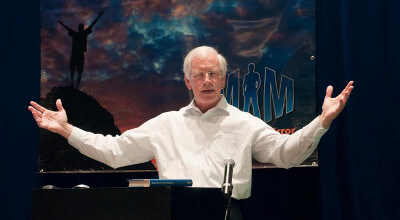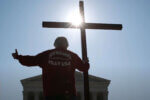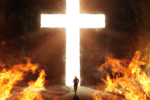Bill, a member of our Board of Directors, said, “When I first became a Christian I would feel so confident at work because I knew what I was doing—like a doctor with a scalpel.
“But when I would walk into church I would feel like putty. I didn’t know where things were, or how the Bible was put together. I didn’t know the major events and periods of the Bible, so I felt queasy and didn’t really like going to church on Sunday.”
One way to increase your Bible confidence is to have a good overview of the story and structure of God’s Word. There’s no “one right way” to organize the Bible. Well, there probably is—the way it’s already organized! If we take the Bible at face value, it already says exactly what God wanted to say exactly the way He wanted to say it.
Still, the Scriptures leave the average human mind nagging for a way to “organize” and “structure” the book for greater comprehension.
The Bible is structured mostly as stories, and written mostly in chronological order. However, besides the obvious division into two Testaments, something else is going on. Not unlike personal transitions from, say, single to married, or from childless to children, there are monumental transitions, or shifts, that take place in the Bible.
As a result, God’s message of love has been communicated differently in different seasons (or periods, ages, epochs). Most Bible scholars are comfortable with some kind of “scheme,” “structure,” or “list” that organizes the major periods, so I’ve put together one for you—11 ages in three stages.
The Story of the Bible
Stage 1: The People of God
The first three ages, from Adam to Joseph, covered about 2,250 years—more than half of the Bible’s timeline—yet all three are compacted into just the single book of Genesis! The first age began with the Creation and ended with the Fall. That was followed by the second age, the Flood, which ended with a covenant from God to Noah. The third period was the Patriarchs with Abraham (who became the father of our faith through the covenant, Isaac, Jacob), and ended with Joseph as the number two man in Egypt. (Genesis)
The next two ages rounded out the five books of Moses. After Joseph, the Hebrews groaned under slavery for 430 years in Egypt, which all ended when Moses theatrically led the Exodus through the Red Sea. However, a rebellious saga turned what should have been a stroll over to the Promised Land, into a wilderness exile—where God gave Moses the Law, including the Ten Commandments—that concluded 40 years later at the border of Canaan. (Exodus, Leviticus, Numbers, Deuteronomy)
Then Joshua led the conquestof the Promised Land, which ended with the land firmly under the control of the Jews. Once in the land, a series of judges led the people of God (whose king was God), but that age ended badly when “the people of God” sinned by asking to become “the nation of Israel” with a human king. (Joshua, Judges, Ruth)
Stage 2: The Nation of Israel
Next came the age of Kings. Kings they wanted, and kings they got—some good like David (good enough for an updated covenant), and some bad like Ahab, but increasingly bad, so that God split up and finally abandoned the nation to its enemies. (1 Samuel, 2 Samuel, 1 Kings, 2 Kings, 1 Chronicles, 2 Chronicles)
The Jews were unceremoniously banished in exileto Babylon for 70 years, where Daniel became the number two man of the land. That dark moment ended when the king of Persia sent a remnant of people back to rebuild the temple. The return to Jerusalem, God’s city, was fraught with problems and ended with Nehemiah rebuilding the wall around the city. And then, silence. There began a famine of the word of God, which lasted for four agonizingly long centuries, until, finally, Jesus ended the drought. (Ezra, Nehemiah, Esther)
Stage 3: The Church of Christ
The Gospels era was bookended by the Incarnation and the Resurrection, when Jesus appeared “in the fullness of time,” and ushered in a “new covenant” through His blood shed for the sins of His children, which inaugurated the kingdom of God. (Matthew, Mark, Luke, John)
After His Resurrection, the early church formed rapidly in Jerusalem with Peter and the Disciples as central figures. It lasted several decades, and came to a close with their deaths—many by martyrdom. (Acts)
Soon after the church formed, the missions era took flight with Peter’s vision for the inclusion of the Gentiles, and the conversion of Paul, who spread the gospel throughout the Roman empire during three missionary trips and ended with the Disciples—mostly Paul—writing the letters that would complete the Scriptures. (Acts through Revelation)
After that, under the direction of the Church Fathers—the disciples of the original Disciples—the canon (Bible) was closed.
The books of Wisdom (Proverbs, Ecclesiastes), Poetry (Job, Psalms, Song of Solomon) and Prophecy (Isaiah through Malachi) are for the most part written to augment the major periods of Kings, Exile, and Return.
The Structure of the Bible
Having a good overview of the story and structure of God’s Word will bolster your Bible confidence—so you don’t have to walk into church feeling queasy. Knowledge is power.
NOTE: If you’re a leader, consider taking one week from your regular study, distribute copies of this article to your me; then discuss the questions below.
GO FURTHER: Take your group through the “A Man’s to the Bible” Video Bible Study series at http://www.maninthemirror.org/video-bible-study.
For Reflection and Discussion
1. What makes the Bible so completely different from any other book? What makes it similar to any other book?
2. What amazes you most about the Bible, and why?
Pat Morley is the Founder and CEO of Man in the Mirror. After building one of Florida’s 100 largest privately held companies, in 1991, he founded Man in the Mirror, a non-profit organization to help men find meaning and purpose in life. Dr. Morley is the bestselling author of The Man in the Mirror, No Man Left Behind, Dad in the Mirror, and A Man’s Guide to the Spiritual Disciplines.








Leave a Comment
You must be logged in to post a comment.